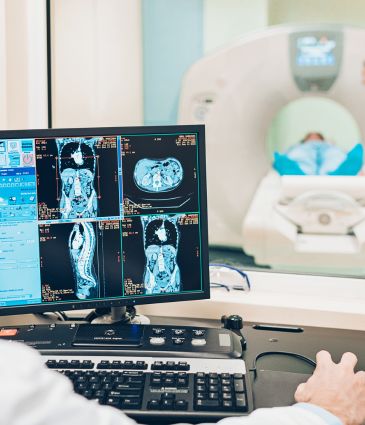
What to Expect When You Go for an MRI
When your doctor has advised an MRI scan, you may be anxious or uncertain about what to expect. That’s completely normal. The good news is that an MRI is a safe, painless, and non-invasive procedure that allows medical professionals to obtain precise pictures of your internal organs without the use of radiation, ensuring your safety and well-being.
What Is an MRI Scan?
MRI stands for Magnetic Resonance Imaging. This medical imaging produces detailed pictures of your organs, soft tissues, and bones using strong magnets and radio waves. Unlike X-rays or CT scans, an MRI scan doesn’t use ionizing radiation, making it a safer choice for many diagnostic evaluations. Doctors often request an MRI to investigate unexplained pain, check for injuries, detect tumors, or monitor chronic conditions like multiple sclerosis or joint problems.
How to Prepare for an MRI Scan
Before your MRI appointment, there are a few things you should do to get ready:
- Inform your doctor about any metal implants, pacemakers, hearing aids, or any history of metal fragments in your body. These can interfere with the scan or pose safety risks.
- Let the staff know if you’re pregnant, breastfeeding, or have kidney issues, especially if contrast dye might be used.
- Avoid wearing metal on the day of your MRI. This includes jewelry, watches, hairpins, underwire bras, and even some makeup products that contain metallic particles.
- Wear comfortable clothing, but you may be asked to change into a gown.
Sometimes, you might be asked to fast for a few hours before your MRI scan, particularly if contrast dye will be used. Make sure you adhere to any guidance your healthcare practitioner may provide you.
What Happens When You Arrive
Once you check in at the imaging center or hospital, you'll fill out a short safety questionnaire. This is a standard procedure designed to ensure your safety during the MRI scan. Then, you’ll be shown to a changing area, where you can store your items in a locker if needed. Before the scan begins, an MRI technologist will talk to you about the procedure. They’ll answer any questions and explain how everything works. This is a great time to share concerns, especially if you’re claustrophobic or anxious. Rest assured, you'll have the full support of the technologist and the team throughout the procedure.
Inside the MRI Room
The MRI machine looks like a big tunnel with a table that slides in and out. Some machines are open or wider than usual, which can help people who feel uneasy in tight spaces. You’ll be asked to lie on the table, usually on your back. Depending on what part of your body is being scanned, a special coil might be placed around the area to help capture clearer images. The technologist will help you get into position, ensuring you’re comfortable and well-supported with pillows or foam pads. They’ll then slide the table into the machine and leave the room, but don’t worry, they can see and hear you at all times. They are there to ensure your comfort and safety throughout the scan. You’ll have a call button to get their attention if you need anything.
During the MRI Scan
The length of an MRI scan varies from a few minutes to an hour, depending on the body part being scanned. It’s important to stay as still as possible during the scan to get sharp images. Throughout the scan, you’ll hear loud tapping, knocking, or humming noises. This is completely normal; it's just the sound of the machine working. Many centers offer earplugs or headphones to help reduce the noise. You may even be able to listen to music. If the doctor has prescribed an MRI with contrast dye, a technologist will inject a special dye through an IV. This helps highlight certain structures in your body more clearly in the images.
After the Scan
Once your MRI scan is finished, the technologist will help you off the table. There’s no recovery time needed. You can go about your day as usual, reassured that any potential side effects are usually mild and temporary. It may be recommended that you drink a lot of water to assist in flushing out any contrast dye you may have received. Although uncommon, undesirable effects may include a slight headache, a metallic taste, or a cold sensation during the injection. After analyzing the pictures, a radiologist will email your doctor a thorough report, which they will discuss with you.
Tips for a Smoother Experience
- Communicate: Let the staff know if you’re feeling nervous or claustrophobic; they can often offer solutions like open MRI machines or mild sedation.
- Relax: Practice deep breathing or mindfulness to stay calm.
- Ask questions: Don’t hesitate to clarify anything before the scan begins.
Final Thoughts
An MRI scan is a great tool that provides your doctor with important information about your health. However, it may seem concerning at first, but knowing what to expect can have a big impact. With proper preparation and the support of a trained team, your MRI experience can be smooth, quick, and stress-free. If you’ve been scheduled for an MRI scan, take a deep breath, you're in safe hands, and the process is simpler than it seems.
- Addiction ( 27 )
- Bariatric ( 2 )
- Cardiology ( 10 )
- Check up ( 45 )
- Ear Nose & Throat ( 1 )
- Eye Care ( 2 )
- General Surgery ( 3 )
- Gynecology ( 6 )
- Hematology ( 2 )
- IVF ( 19 )
- Neurosurgery ( 5 )
- Oncology ( 10 )
- Orthopedics ( 8 )
- Physiotherapy ( 1 )
- Plastic & Beauty ( 7 )
- Stem Cells & Longevity ( 19 )
- Transplantation ( 4 )
- Urology ( 7 )







